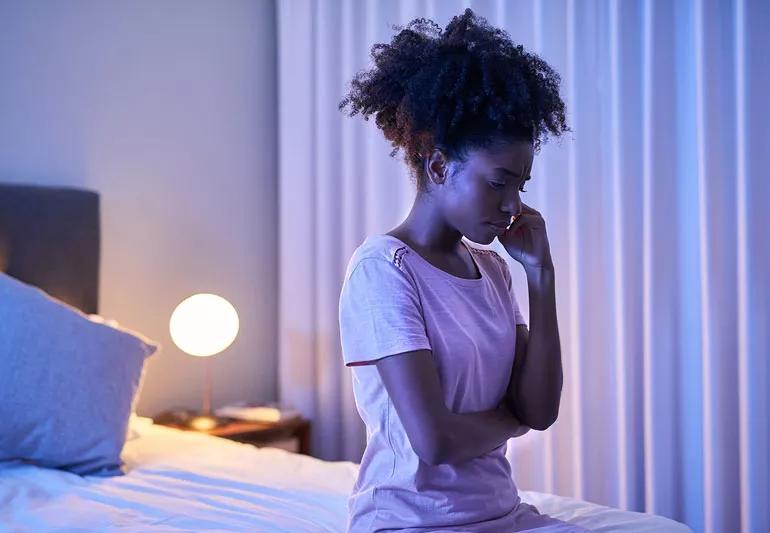Reasons why nerve pain is more painful at night

Image content: This image is available to view online.
View image online (https://assets.clevelandclinic.org/transform/b2a7c48d-2a71-48ae-8752-849b7d6d45a5/neoropathyPainNight-1035551340-770x553_jpg)
Cant sleep at night because of pain
Peripheral neuropathy is when a nerve or group of nerves outside of the brain and spinal cord is injured or dysfunctions. It could be because of an injury to a single nerve, like carpal tunnel syndrome, or because a group of nerves have become defective, like with peripheral neuropathy of the feet.
Advertisement
Cleveland Clinic is a non-profit academic medical center. Advertising on our site helps support our mission. We do not endorse non-Cleveland Clinic products or services. Policy
“Across the board we know that neuropathy can cause pain depending on what type of nerves are involved,” says neurologist Benjamin Claytor, MD. “When people describe worsening symptoms at night they’re describing discomfort – pins and needles, tingling and burning pain.”
Here Dr. Claytor discusses what might be causing this nightly pain and how to find relief.
Video content: This video is available to watch online.
View video online (https://cdnapisec.kaltura.com/p/2207941/sp/220794100/playManifest/entryId/1_b7bgpswl/flavorId/1_5f3sgelj/format/url/protocol/https/a.mp4)
Learn more about peripheral neuropathy.
Our attention level can influence how we perceive pain. So during the day when we’re at work or taking care of the kids – we’re distracted and busy. Although there hasn’t been much research around it, the idea is that we aren’t focusing on the pain during the day because we’re busy, we pay less attention to it and perceive less pain.
“Many patients will tell me that after they get home from work, have dinner and sit down to watch TV for the night that their pain flares up,” says Dr. Claytor. “This could be because the daytime distractions are now gone and you’re starting to unwind for the night.”
Another thought behind nightly neuropathy has to do with temperature. At night our body temperature fluctuates and goes down a bit. Most people tend to sleep in a cooler room as well. The thought is that damaged nerves might interpret the temperature change as pain or tingling, which can heighten the sense of neuropathy.
Advertisement
Also consider poor sleep quality. If you’re not sleeping very well to begin with, either due to poor sleep habits or sleep related disorders, this could lead to increased pain perception.
Our emotional state can also influence how we perceive pain. Stress and anxiety can feed in to and amplify pain signaling. Living in a chronic state of stress wreaks havoc on your physical and mental health.
Sometimes medication dosing and timing might need to be adjusted, which could be particularly true for some short acting medications used for neuropathy pain.
“There are options we can explore if your neuropathy pain seems to be worsening at night,” explains Dr. Claytor. “There might be oral or topical medications we can prescribe, or maybe it’s getting your stress under control and being more mindful.”
Cognitive behavioral therapy, physical therapy and meditation may be complementary tools to reduce pain as well.
Dr. Claytor stresses the importance of talking to your doctor sooner rather than later. Often time’s people will wait so long to see their physician that there’s permanent nerve damage that might have been avoided.
“I think one of the most important things I can discuss with a patient who comes in with neuropathy pain at night is getting to the root cause of what is actually driving it,” says Dr. Claytor. “Depending on what the underlying cause is, treating that first and foremost can usually help reduce the pain overall – especially at night.”
Advertisement

Sign up for our Health Essentials emails for expert guidance on nutrition, fitness, sleep, skin care and more.
Learn more about our editorial process.
Advertisement
The short answer from a neurologist
These neurological conditions affect muscle movement in separate ways
Both terms have been replaced by autism spectrum disorder (ASD)
It typically happens when blood flow is blocked when a limb rests in the same position too long
The simple answer is ‘yes’ — but the ‘why’ is much more complex
Studies suggest CBD has wide-ranging benefits, but there’s a catch or two
A pediatric neurologist explains the troubling rise in teens with tics
How to avoid tingling, burning or stabbing in your feet
Although it could be used as a moisturizer, this new trend is not recommended
Communicating clear limits helps protect your time, energy and emotional well-being
High cholesterol can be genetic, but testing and treatment can lower your heart disease risk